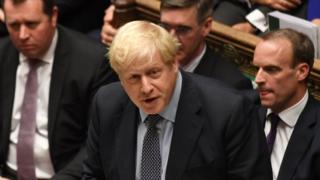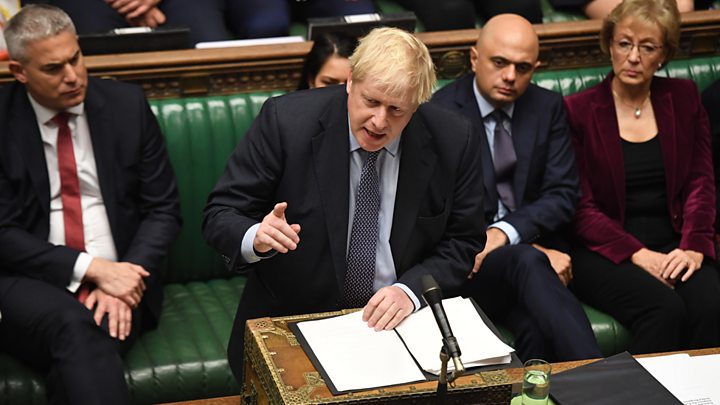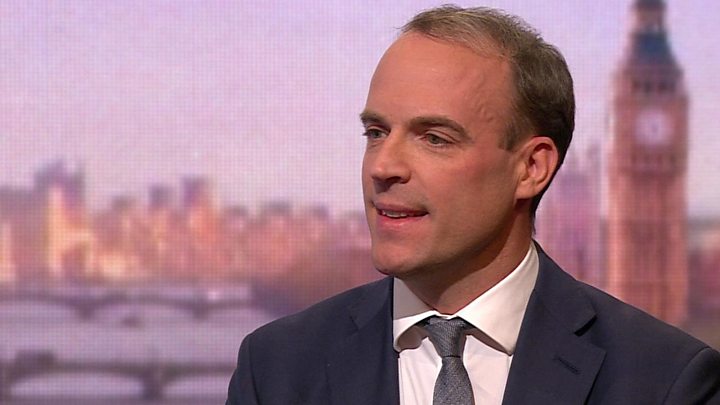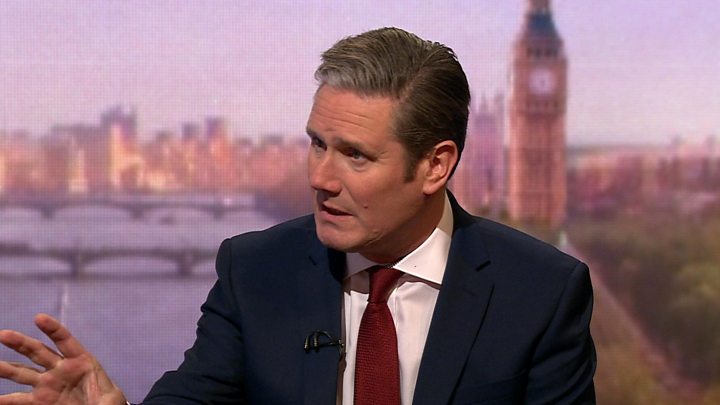 Image copyright
Image copyright
Reuters
Boris Johnson sent a letter to the EU asking for a Brexit delay but did not sign it
Parliament must be given “a straight up-and-down vote” on the PM’s Brexit deal, No 10 says, after MPs delivered a major blow to his strategy on Saturday.
Boris Johnson was forced by law to send a letter asking the EU for a new delay on Brexit, but did not sign it.
The PM now wants MPs to say a clear “yes” or “no” to the deal on Monday, adding: “We cannot allow Parliament’s letter to lead to Parliament’s delay.”
It will be up to Speaker John Bercow to decide whether to allow the vote.
Mr Johnson reached a new deal with the EU last week, but it needs to be approved by the UK Parliament.
The deal ditches the backstop – the “insurance policy” designed to prevent a return to physical checks on the Irish border.
Instead it will, in effect, draw a new customs border in the Irish Sea, because goods which could then travel onwards to Ireland will have to pay a duty tax.
The whole of the UK will leave the EU customs union, meaning it could strike trade deals with other countries in the future.
The EU is now considering how to respond to the UK’s request for a delay, but has said Saturday’s developments did not mean that the deal had been rejected.
The UK is due to leave the EU in 10 days time.
Boris Johnson’s Brexit deal
Image copyright
AFP
IN BRIEF: How Parliament forced a delay
EXPLAINED: How the delay request works
ANALYSIS: What is in Boris Johnson’s new deal?
IN GRAPHICS: What happens now?
IN FULL: Boris Johnson’s Brexit delay letters
So what happens now?
On Monday, the government will make a second attempt to hold the meaningful vote, presenting MPs with a straight choice to approve or oppose the deal in principle.
Whether the Speaker, John Bercow, will allow that, though, is not yet clear – he could rule it out on the grounds it amounts to debating the same matter twice.
No 10 said: “Letwin’s delay amendment turned Saturday into a meaningless vote and denied MPs and the public the chance to end the uncertainty.”
It added: “Parliament needs a straight up-and-down vote on the deal – do MPs want to respect the referendum like they claim to… or do they want to frustrate and cancel Brexit altogether?”
The government also plans to introduce the legislation required to implement the Brexit deal – the Withdrawal Agreement Bill – during Monday’s Commons session.
Having been thwarted by MPs on Saturday, Boris Johnson wants to try again today. A move that looks set to be rejected by the Speaker.
That will then pave the way for a gruelling parliamentary battle as Mr Johnson seeks to push his Brexit bill through the Commons by the end of he week.
A timetable that may well be blocked by MPs – making it impossible for Mr Johnson to met his 31 October deadline.
At the same time, the opposition parties are already preparing a flurry of amendments – including one on so called confirmatory referendum.
More likely to garner support will be a move by Labour to keep the UK in a customs union.
Significantly the DUP have not closed the door to such an option.
The government view such motions as wrecking amendments designed to stop Brexit.
Even so they confidently predict they now have the numbers to get the deal through the Commons.
However in the late nights and long parliamentary hours ahead – the potential for ambushes and carefully crafted amendments abound.
The parliamentary battle over Brexit – if anything – looks set to intensify.
What is the Withdrawal Agreement Bill?
The UK needs to pass a law to implement the withdrawal agreement – the part of the PM’s Brexit deal that will take the country out of the EU – in UK law.
It has to secure the backing of a majority of MPs – and then of peers in the House of Lords. And a vote for the Brexit deal itself is no guarantee of a vote for the legislation required to implement it.
The bill gives legal affect to any agreed transition period and fulfils requirements on the rights of EU citizens in the UK after Brexit. It will also allow ministers to make “divorce payments” to the EU foreseen under the current deal.
MPs will be able to vote on amendments – changes or add-ons – to the bill.
If the government cannot get the bill through Parliament the default legal position is that the UK cannot ratify the deal, and so would leave on 31 October without a deal. However, that is dependent on no extension beyond that date having been already agreed with the EU.
Why did the PM ask for an extension?
Having reached a new Brexit deal with the EU last week, the prime minister had intended to bring it to Parliament on Saturday and to ask MPs to approve it in a so-called “meaningful vote”.
The numbers looked tight for the PM, especially without the support of his erstwhile allies the DUP, but Tory Brexiteers had thrown their weight behind it as had a number of Labour MPs and independents.

However, instead of voting on the deal itself, MPs instead voted in favour of an amendment – tabled by former Tory MP Sir Oliver Letwin – withholding approval of the deal until the legislation to implement it had been passed.
That triggered the Benn Act which required Mr Johnson to send a letter to Brussels requesting a delay to the UK’s departure.

He did that, but left it unsigned – and accompanied it with a second, signed letter which said he believed a delay would be a mistake.
On Sunday, ministers insisted the government believed it still had sufficient support in the Commons to pass the deal and remained committed to a 31 October departure.
The Cabinet Office, meanwhile, has triggered Operation Yellowhammer – its contingency plan to handle a no-deal Brexit – because it said there was no guarantee the EU would grant an extension.
What is happening in the courts?
Scotland’s highest court will consider whether Mr Johnson has fully complied with the law in his correspondence with Brussels.
The Court of Session will be asked to decide whether, in sending contradictory letters, the prime minister broke a promise not to “frustrate” the so-called Benn Act.
One of the campaigners bringing the action, SNP MP Joanna Cherry said: “It will be for the court to decide whether his actions… are in breach of the undertakings he gave them, or a contempt of court.”
The government maintains it has fulfilled its legal obligations.
What does the opposition say?
Labour, the SNP, Lib Dems and others roundly criticised Mr Johnson’s decision to send two letters to the EU, calling it “childlike” and “petulant”. They also suggested he may have broken the law – or at least tried to “frustrate” it.
On the deal itself, shadow Brexit secretary Sir Keir Starmer told the BBC’s Andrew Marr that Labour would seek to make changes to it, in particular backing an amendment requiring it to be put to another referendum – up against Remain.

He said he believed that would most likely be tabled by a backbencher, but insisted: “It’s got to go back to the public.”
Labour had planned to vote against Boris Johnson’s deal, arguing it would be bad for the economy, jobs, workers’ rights and other areas such as the environment.
Sir Keir said the party would push for other changes when the bill was brought to Parliament, for example by demanding a UK-wide customs union with the EU and single market alignment, and ensuring there could not be a no-deal “trapdoor” at the end of the transition period if no free-trade agreement was reached with the EU.
Brexit: No 10 to push again for vote on Boris Johnson’s deal}


